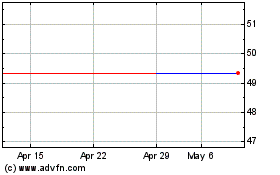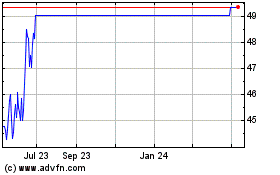UPS Sues Over TNT Deal -- WSJ
February 27 2018 - 3:02AM
Dow Jones News
Shipping company wants $2.15 billion from Europe's antitrust
regulator
By Natalia Drozdiak
This article is being republished as part of our daily
reproduction of WSJ.com articles that also appeared in the U.S.
print edition of The Wall Street Journal (February 27, 2018).
BRUSSELS -- United Parcel Service Inc. is suing the European
Union's antitrust watchdog for EUR1.74 billion ($2.15 billion) plus
interest over its veto of UPS's merger with Dutch parcel-delivery
company TNT Express NV, a move that could prove fruitful at a time
when the bloc's top courts increasingly scrutinize the competition
cop's decisions.
Indeed, an EU court last year overturned the European
Commission's rejection of the planned $7 billion acquisition of TNT
in January 2013, citing procedural missteps.
Atlanta-based UPS is seeking compensation for the commission's
decision, which the shipping company says prevented it from
"materializing the benefits associated with that proposed
transaction," according to court documents published Monday.
The commission will defend itself in court, an EU spokesman
said. The regulator was already appealing the judgment against its
veto of the TNT deal.
In the past, the EU's two top courts rarely annulled decisions
by the antitrust regulator, which built a fearsome reputation over
the past two decades through a series of high-profile cases against
America's biggest companies, including General Electric Co.,
Microsoft Corp. and Alphabet Inc.'s Google. But recent court
rulings have put the commission on the defensive.
In September, the EU's highest court backed Intel Corp.'s appeal
of a EUR1.06 billion antitrust fine levied by the commission in
2009, referring the case back to a lower court.
The actions by the two Luxembourg-based EU courts are welcomed
by companies and lawyers, who complain that checks and balances in
the bloc's system are too weak. They cite the antitrust watchdog's
autonomy and its power to act as the prosecutor, judge and jury in
competition cases.
While companies can appeal decisions to the EU's top courts,
judges there look for obvious legal errors rather than seeking to
form a new opinion on cases and rarely overturn decisions made in
Brussels. U.S. enforcers, by contrast, need to prove their cases
before a judge from the outset.
"There is a feeling among the companies and competition
practitioners that the courts have been rather lenient to the
commission and therefore, it's either better to settle or to forget
about appealing," said Assimakis Komninos, a Brussels-based partner
at global law firm White & Case." "There have been a couple of
cases, which shows a bit [of] movement on the side of the court,
but look at where we are coming from."
Only a handful of merger vetoes have been overturned by the top
courts, despite legal challenges being routine. In those rare
instances, companies have typically sought compensation from the
commission. In 2003, Schneider Electric SA sued for nearly EUR1.7
billion after its acquisition of French electrical equipment maker
Legrand was blocked but later overturned. In the end, the
commission was ordered to pay EUR50,000 in damages to
Schneider.
After UPS called off its deal for TNT due to the commission's
opposition, logistics rival FedEx Corp. stepped in, acquiring the
business in 2016 for EUR4.4 billion. The deal expanded FedEx's
reach in Europe, but the acquisition hasn't been trouble-free. Last
summer, the TNT unit was hit with a cyberattack that crippled
operations for months and required hundreds of millions of dollars
in spending to fix.
The EU blocked the UPS-TNT deal on concerns the
overnight-parcel-delivery market would effectively become a duopoly
between a combined UPS-TNT business and DHL, a unit of Deutsche
Post AG. The regulator also worried that other parcel-delivery
companies, including FedEx, could be shut out of the market.
UPS continues to defend the deal.
"We feel strongly that the proposed acquisition would have
constituted a good deal for logistics customers," said Gregg
Svingen, a spokesman for UPS, said Monday. "The compensation being
sought corresponds to what we believe, through objective
assessments verified by expert third parties, to be the value of
the opportunity wrongly prohibited by the European Commission."
--Paul Ziobro contributed to this article.
Write to Natalia Drozdiak at natalia.drozdiak@wsj.com
(END) Dow Jones Newswires
February 27, 2018 02:47 ET (07:47 GMT)
Copyright (c) 2018 Dow Jones & Company, Inc.
Deutsche Post (PK) (USOTC:DPSGY)
Historical Stock Chart
From Jun 2024 to Jul 2024

Deutsche Post (PK) (USOTC:DPSGY)
Historical Stock Chart
From Jul 2023 to Jul 2024
